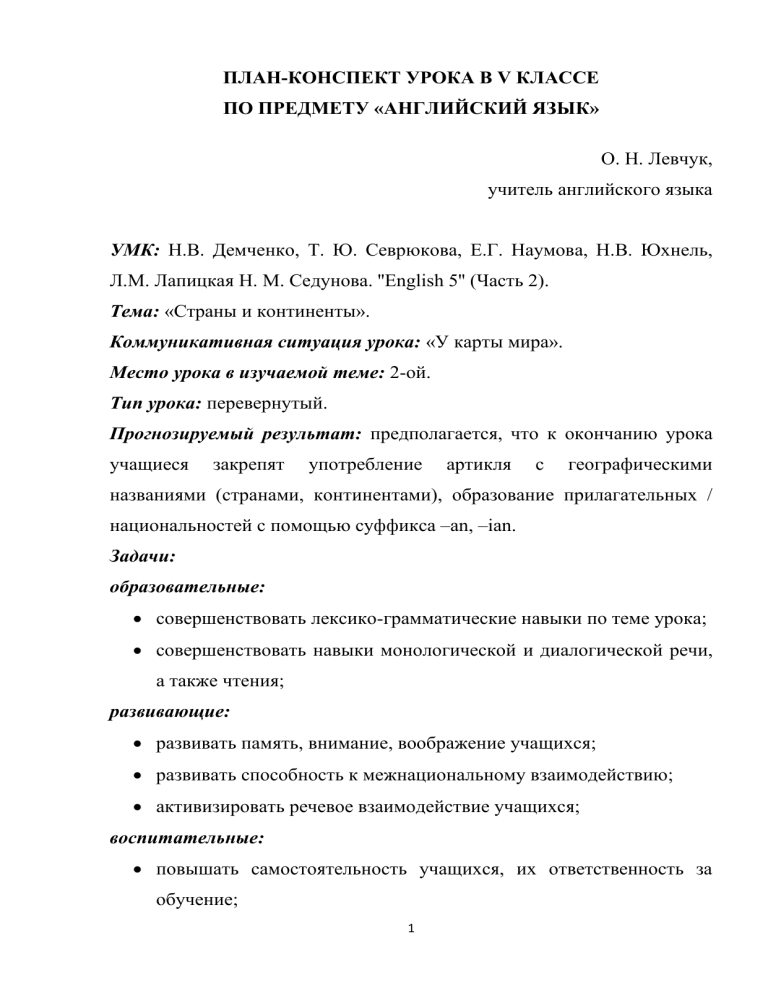
ПЛАН-КОНСПЕКТ УРОКА В V КЛАССЕ ПО ПРЕДМЕТУ «АНГЛИЙСКИЙ ЯЗЫК» О. Н. Левчук, учитель английского языка УМК: Н.В. Демченко, Т. Ю. Севрюкова, Е.Г. Наумова, Н.В. Юхнель, Л.М. Лапицкая Н. М. Седунова. ''English 5'' (Часть 2). Тема: «Страны и континенты». Коммуникативная ситуация урока: «У карты мира». Место урока в изучаемой теме: 2-ой. Тип урока: перевернутый. Прогнозируемый результат: предполагается, что к окончанию урока учащиеся закрепят употребление артикля с географическими названиями (странами, континентами), образование прилагательных / национальностей с помощью суффикса –an, –ian. Задачи: образовательные: совершенствовать лексико-грамматические навыки по теме урока; совершенствовать навыки монологической и диалогической речи, а также чтения; развивающие: развивать память, внимание, воображение учащихся; развивать способность к межнациональному взаимодействию; активизировать речевое взаимодействие учащихся; воспитательные: повышать самостоятельность учащихся, их ответственность за обучение; 1 воспитывать толерантность, миролюбие, принятие и понимание других людей, умение позитивно с ними взаимодействовать; воспитывать патриотизм (гордость за принадлежность к определенной нации). ХОД УРОКА 1. Организационно-мотивационный этап. Целеполагание. На доске карты мира с названиями континентов, стран и национальностей: 2 T: Look at the world maps. What are they about? Ps: They are about continents, countries, nationalities. Учитель записывает эти три слова на доске. Это тема урока. T: This is what we are going to speak about today – about continents, countries and nationalities. 2. Проверка домашнего задания (оперативно-деятельностный этап). T: How many continents are there in the world? Ps: Seven! T: What are they? Учитель показывает на карте, учащиеся хором называют. Ps: Australia, Africa, North America, South America, Asia, Antarctica, Europe. Дома учащиеся выполнили упражнения 1a, 1b (стр.68) в рабочей тетради, где необходимо было записать континенты в порядке убывания и страны в алфавитном порядке. 3 T: Anya, come to the board. Point and say the continents in the order from the largest to the smallest. Anya: Asia, Africa, North America, South America, Antarctica, Europe, Australia. T: Is she right? Ps: Yes. T: Say the names of the countries in the alphabetical order. P1: America, Australia, Belarus, P2: Bulgaria, India, Italy, Russia, P3: the United Kingdom, the United States of America. T: Belarus is in Europe. Where is Italy? P1: Italy is in Europe. T: Where is India? P2: India is in Asia. T: Where is the UK? P3: The UK is in Europe. 4 T: Where is Canada? P4: Canada is in North America. T: Where is Australia? P5: Australia is in Australia. T: Work in pairs. Ask and answer. На доске опора: Where is Belarus? Belarus is in Europe. Также дома учащиеся просмотрели видеоролик “Countries and Continents”, подготовленный учителем. https://drive.google.com/open?id=1PcIS3X5e98fEFUAWI5t0ekku4M_c4mV Выучили по нему правила: 1) названия стран и национальностей; 2) суффикс – an, –ian; 3) суффикс с географическими названиями (страны, континенты). T: Let’s read some facts about continents. Workbook, ex.2, page 72. Fill in the articles a, an, the if necessary. 5 T: Take your books, open them, page 72, ex.5a. Make adjectives for languages and nationalities. Look at the box. Let’s read all together. T+Ps: Belarus – Belarusian. America – American. T: Make up adjectives or nationalities. Russia. Ps: Russian. Etc. T: One by one. P1: Russia – Russian. P2: Australia – Australian. Etc. T: Russians, Bulgarians, Indians, Belarusians are nationalities. Nationality – repeat. People from different countries have different nationalities. На доске: Country Nationality America – Australia – Italy – Russia – Belgium – Brazil – 6 India – Hungary – Ukraine – Belarus – T: Look at the board. Sasha, can you read these names of countries? P1: Sure. (Читает.) T: Open your exercise-books. What date is it today? P2: It’s the … of April. T: Write down the date and names of countries in column. Make up nationalities or adjectives. Учащиеся записывают все в тетрадь и по очереди работают у доски. T: Let’s read all together. На доске: What nationality are you? I’m … Учащиеся получают карточки с предложениями: https://drive.google.com/open?id=1TeOg_vfM3zmFLhvdwY0nZdOGgcRTAEs I’m Italian. I’m Russian. I’m Belarusian. I’m Ukrainian. I’m Latvian. I’m Brazilian. I’m Hungarian. I’m Norwegian. I’m Bulgarian. I’m Indian. I’m Austrian. 7 T: What nationality are you? Repeat. Ask Katya, all together. Ps: What nationality are you? P1: I’m Indian. T: Ask Vera. Ps: What nationality are you? P2: I’m Belarusian. Etc. Физкультминутка. «Шестеренка». Продолжают работать с теми же карточками и вопросом. T: Stand up. Make two lines. Find your partner. Ask and answer, change your cards. Учащиеся становятся друг напротив друга. У каждого из них одна из карточек. По сигналу учителя учащиеся задают друг другу вопрос What nationality are you? и отвечают на него. По сигналу учителя (хлопок / звонок) учащиеся перемещаются по часовой стрелке и меняют партнера. Перед тем как переместиться учащиеся, стоящие друг напротив друга, меняются карточками. Действие повторяется до тех пор, пока к учащемуся не вернется карточка, с которой он начинал данный вид интерактивного задания. T: I’m from Europe. I’m European. I’m from Africa. I’m … Ps: African. T: I’m from Asia. Ps: I’m Asian. T: I’m from Australia. Ps: I’m Australian. 8 Презентация. https://drive.google.com/open?id=12MJoUSb9CM4hoFk9VZRqYpSIiiP7K1My На слайдах картинки людей различных национальностей и предложения. Сначала учащиеся смотрят на сменяющиеся слайды и читают предложения хором. Затем учитель показывает первый слад, вызывает ученика, он читает предложение и строит свое (второй слайд). Например, She is from Belarus. – She is Belarusian. (Фронтальный опрос) T: Look at the slides and read. T: Make up sentences. Look at the picture. For example, she is from Belarus. So, she is Belarusian. 3. Рефлексия. Учитель показывает картинку на доске. T: You can see people of different nationalities in the picture. They are different. We are different. But we are connected. How? Предполагаемые ответы учеников: We are people. We live on one planet. Etc. 9 Учитель показывает следующую картинку на доске. T: We live in the world of different cultures, languages and appearances. In spite of our differences we all smile in the same language. How do you understand it? Предполагаемые ответы: We can see people differently because of their differences but we can also see people the same because of our similarities. A smile is universally understood. Etc. T: Let’s read Ramiro’s opinion about it. I don’t know what nationality he is but we can smile in the same language. Учащиеся получают карточки с текстом. Чтение. https://drive.google.com/open?id=1eItZrRxr3BwP2vT995YpEm9khMmdsV ve 10 P: I’ve been lucky to travel to different countries where I couldn't communicate very well, but what I found out is that if someone wants to help, there are always ways to understand each other. P2: The body language, the gestures and the sincerity in the eyes make the way to make a human connection. At the same time, the phrase can also mean that no matter where we come from, country, culture, language. (This extract is taken from https://www.quora.com/Someone-once-said-Everyonesmiles-in-the-same-language-What-do-you-think) T: Do you agree with Ramiro? Once you see anyone as your equal, is clear that we are not so different after all and a simple smile is proof of that. 4. Домашнее задание. На доске: Ex.2a, b, pages 68-69 (WB) 11 T: At home work with the names of different countries and nationalities again and do the following tasks: WB, ex.2a, page 68. P1: Jon is very bad at spelling. He wrote only one word correctly. Correct all the mistakes. T: WB, ex.2b, pages 68-69. P2: Use the names of nationalities to complete the facts below. The pictures can help you. T: Any questions? 12 5. Рефлексивно-оценочный этап. Комментированное выставление отметок. T: Stand up, please. Make a circle. Join hands with each other. Smile and answer the question: What nationality are you? Ps: I’m Belarusian! (We are Belarusians!) T: Are you proud of being Belarusians? I hope, yes. 13
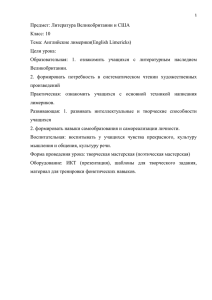
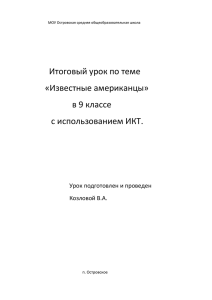
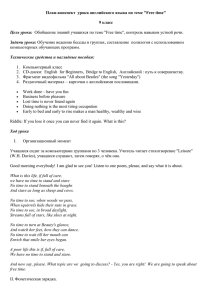
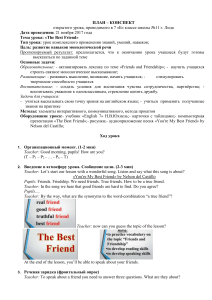
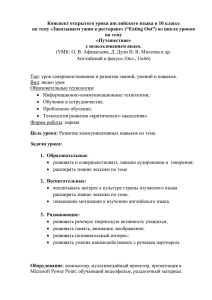
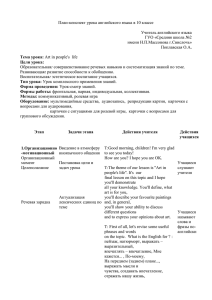
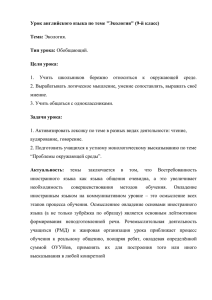
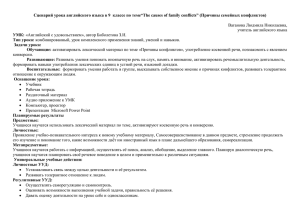
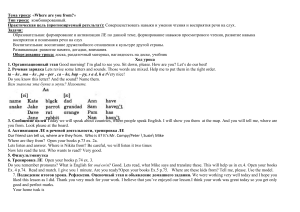
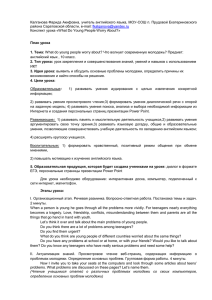
![Speakout Third edition A1 Students Book [books-here.com]-страницы-3](http://s1.studylib.ru/store/data/006551791_1-a2b53411e3faed55893fd7fc5f6d2278-300x300.png)